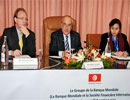The World Bank Group and the Ministry of Development and International Cooperation are jointly presenting the Country Partnership Strategy to members of Government and Parliament on February 12th at the Africa Hotel in Tunis.
The World Bank Group’s Country Partnership Strategy (CPS, for the period FY10-13) sets out the enhanced strategic engagement in Tunisia in support of the country’s 11th National Development Plan (NDP). The NDP charts an ambitious course to generate sufficient employment through transforming Tunisia’s economy to a higher value-added, knowledge-intensive one. Alignment with the NDP, flexibility in approach and selectivity in the areas of engagement are the core principles of the CPS.
The Government and the World Bank Group have agreed on three CPS strategic pillars:
1. Employment, growth and competitiveness;
2. Sustainable development and climate change; and
3. Improving the quality of service delivery.
Within these pillars, the CPS outlines a partnership program which is grouped into results areas that facilitate focusing activities and tracking impact. The rolling nature of the NDP obliges the Bank Group’s program to be flexible, responding to challenges and demands as they present themselves. As the program is implemented, the Bank and Government will jointly assess progress and update results and indicators to reflect the increased specificity of the program and to ensure continued alignment.
The CPS sets out the strategic direction for the World Bank Group to step up its engagement, reflects a strengthening of the partnership with Tunisia and provides an excellent opportunity for the Bank to provide enhanced support to a well performing, middle-income country.
The CPS outlines a lending program up to $280 million for FY10 and an indicative lending program for FY11-13, as well as details how the Bank’s regional integration initiatives and its management of global funds can benefit Tunisia. The CPS discusses the risks faced by Tunisia and the Bank Group’s program and describes the measures for mitigating these risks.
The World Bank’s dissemination schedule of the CPS for the coming months includes a comprehensive diversity of audiences as well as decentralized presentations which will take place in key Tunisian cities outside the capital.
The Bank’s engagement emphasizes the importance of understanding the Tunisian context and building on the strong relationship that already exists. The World Bank Group is working with a Government that has a strongly-owned strategy and a solid understanding of where the Bank can add value. IBRD financing is very small compared to the country’s budget so the Bank’s financing role must be selective on the critical priorities. Similarly, IFC financing will selectively target projects where its additionality, role, and development impact are clear. The Bank’s role will be very much in the vein of partnering with the country when requested and agreeing on how and where we should and should not engage. Within this context, and with the benefit of the lessons learnt from the implementation of the Bank’s program to date, the main principles that guide the Bank’s partnership for the future are alignment, flexibility and selectivity.
Tunisia’s 1lth National Development Plan (NDP, 2007-2011) charts an ambitious course to generate sufficient employment through transforming its economy to a higher value-added, knowledge-intensive one that will allow it to consolidate and improve its strong progress to date.
The NDP builds on a prolonged period since the 1960s of very solid economic and social development often in the face of unprecedented challenges and exogenous shocks. However, high unemployment threatens the social achievements to date and the impact of the global crisis puts extra pressure on Tunisia to do better in terms of growth. Tunisia recognizes that it needs to carry out a transformation to a higher value-added, knowledge-based economy through increasing further the integration of its economy, bringing about even faster improvements in productivity growth and innovation, and carrying out deeper structural reforms in order to generate employment, particularly for its well-educated population.
Tunisia is calling on the World Bank to play a key role in its development plan and strengthen its partnership through its knowledge engagement and financing. The Bank has remained a valued partner during important periods in Tunisia’s development, most often for its knowledge role, although IBRD financing has proven important and timely. The Bank has a broad program already in Tunisia and a productive dialogue with the Government and the country’s development partners. This invitation for the World Bank to step up its engagement reflects a strengthening of the partnership with Tunisia and provides an excellent opportunity for the Bank to provide enhanced support to a well performing, middle-income country.












